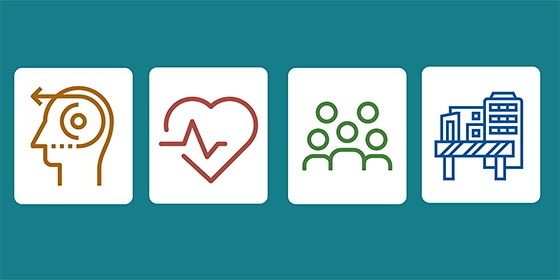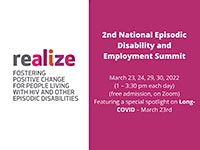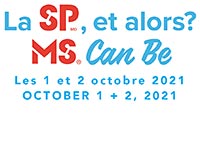|
|
||
|
We need your help! ACED seeking people to evaluate new accommodation planning toolThe development of the first tool to be included in the ACED toolkit is now complete. The “JDAPT” – Job Demands and Accommodation Planning Tool – asks about health-related difficulties doing a range of job demands and then provides the user with a personalized list of potential work supports and accommodation ideas. We need your help in evaluating this interactive online tool to ensure that it is relevant and practical for its users!
|
||
|
|
Second annual virtual summit on episodic disabilities and work happening this monthACED partner Realize is hosting the second annual Virtual National Summit on Episodic Disabilities and Employment over four two-hour sessions between March 23 and 30, 2022. The event is free to attend and will highlight tools, research and projects that are beneficial to both people living with episodic disabilities (including long-COVID) and their employers. Dr. Monique Gignac, the ACED project director, will be presenting on the workplace communication decisions of older workers who want to remain employed, and on organizational perspectives related to the disclosure, privacy and workplace accommodation of episodic disabilities.
|
|
Webinar: Examining the quality of employment of persons with disabilitiesPersons with disabilities face persisting inequities in the labour market. When they are successful finding work, what kind of jobs do they get? In an IWH Speaker Series presentation on April 12, Dr. Faraz Vahid Shahidi will share findings from a recent survey examining the employment quality of persons with disabilities in Canada. He will also offer findings on the nature and extent of employment inequities they experience and the consequences of these inequities for support and accommodation in the workplace. Dr. Vahid Shahidi was previously affiliated with ACED in a post-doctoral capacity.
|
|
|
ACED forms new committee of people with lived experience of an episodic conditionACED recently set up an Expert Advisory Committee (EAC) of five people who live and work with a chronic episodic condition. Among other things, the committee will suggest the best ways to reach potential users of ACED tools and help identify key issues that are currently not being adequately addressed by workplace supports.
|
|
|
Understanding the work experiences of people with IBD: a work in progressFormer ACED student Leslie Cheng recently shared the results of her practicum with ACED partner Crohn’s and Colitis Canada, during which she explored how people with inflammatory bowel disease (IBD) experience “work.” Cheng points to a number of key takeaways: challenges in the workplace are common, yet they are not all captured in currently published scientific literature; a one-size-fits-all approach to workplace accommodations does not work; co-workers and supervisors can be important sources of support; and dietary needs can impact social interactions in the workplace.
|
|
|
People’s reasons for disclosing episodic disabilities linked to support they receiveShould people with an episodic disability disclose their condition at work? It's a complex decision. A recent study conducted by ACED project director Dr. Monique Gignac looked at people’s reasons for disclosing (or not). It reaffirmed that people’s health needs, as well as their perceptions of their workplace as supportive, were among the most important factors for disclosing. More findings are available in an article published in the Institute for Work & Health newsletter At Work.
|
|
|
Now available: Gignac 2021 presentation to young adults with MSACED partner MS Society of Canada hosted the “MS Can Be 2021” virtual summit in October 2021 for young adults from across Canada who are affected by multiple sclerosis (MS). The summit was an opportunity for these young adults to network and learn about topics related to employment, finance, health care and wellness. ACED project director Dr. Monique Gignac provided information on what the evidence says about talking to an employer about a disability and what to potentially consider in terms of work accommodation and support.
|
|
|
|
For more information about the study, contact: Julie Bowring
|
||
|
|
||
|
|
|
|







